Epiphone Les Paul Studio
$184.99
Get ready to rock with the Epiphone Les Paul Studio electric guitar, offering classic Les Paul tone and styling at an affordable price.
Compare
Description
As one of the most popular electric guitars in the world, the Les Paul has become an icon representing power, elegance, and style. The Epiphone Les Paul Studio is a testament to these qualities, as it presents a high-quality instrument at an affordable price point.
The Les Paul Studio has been a staple in Epiphone’s lineup for years, and it’s easy to see why. The guitar features a mahogany body with a carved maple top, delivering a warm and rich tone that’s perfect for almost any genre. The body is also relatively lightweight, making it comfortable to play for extended periods.
The neck is also made of mahogany and features a comfortable and fast SlimTaper D-shape profile. It’s topped off with a rosewood fingerboard, which has the perfect amount of resistance for a smooth playing experience. Additionally, the frets are easy to navigate, making it an excellent guitar for beginners who are still learning their way around the instrument.
In terms of pickups, the Epiphone Les Paul Studio features a pair of Alnico Classic humbuckers. These pickups offer a classic tone that’s perfect for rock, blues, and jazz, but they also have enough flexibility to keep up with a wide range of different styles. From warm and mellow to bright and snappy, these pickups offer a classic sound that Les Paul fans will love.
The guitar also comes equipped with quality hardware, like Grover machine heads to keep the guitar in-tune, which is crucial for a guitar player. Meanwhile, the tune-o-matic bridge and stop bar tailpiece provide excellent sustain and resonance.
Overall, the Epiphone Les Paul Studio is a fantastic choice for anyone looking for a great Les Paul guitar without breaking the bank. Whether you’re a beginner or a seasoned pro, this guitar delivers excellent build quality, sound, and playability. And with its classic design and sleek looks, it’s sure to turn heads wherever you play it.
Epiphone Les Paul Studio properties
| Product name |
Epiphone Les Paul Studio |
| Brand |
Epiphone |
| Type |
Electric Guitar |
| Size |
4/4 |
| Colour |
Black, Red, Sunburst/Colourburst, White |
Frequently Asked Questions:
What are some recommended settings for the pickups and tone controls on my Epiphone Les Paul Studio electric guitar?
The recommended settings for your Epiphone Les Paul Studio electric guitar can vary depending on the sound you're going for. However, here is a general guideline to get you started:
- Pickup Position: When playing with both pickups engaged (bridge and neck), set the tone control for each pickup close to or at maximum for a balanced, warm tone. For a brighter and more focused sound, try rolling off the tone knob on the bridge pickup while leaving the tone knob on the neck pickup at maximum or slightly rolled back.
- Pickup Selection: When playing with just one pickup engaged, adjust the volume knob for that pickup to taste. For a smooth and mellow sound, use the neck pickup with the tone control rolled off a bit. For a brighter, more aggressive sound, use the bridge pickup with the tone control at maximum or slightly rolled back.
- Tone Control: The tone control on your Epiphone Les Paul Studio electric guitar affects both pickups when both are engaged. To get a warmer, rounder sound, roll off the tone control. For a brighter and more focused sound, turn up the tone control.
Remember that these settings are just guidelines and can be adjusted according to your personal preference and playing style. Don't hesitate to experiment with different settings until you find the perfect sound for your music!
What factors contribute to the sonic differences between an Epiphone Les Paul Studio and its Gibson-branded counterpart?
While both the Epiphone Les Paul Studio and its Gibson-branded counterpart share a similar design, there are distinct sonic differences between the two guitars. Several factors contribute to these variations in sound, including materials, construction techniques, and pickup selection. Firstly, the choice of materials used in each guitar's production plays a significant role in their tonal characteristics. Epiphone Les Paul Studios are typically crafted using mahogany bodies and necks, while Gibson-branded models often feature solid mahogany or maple bodies with necks made from mahogany or rosewood. Mahogany is known for its warm, rich tone, making it a popular choice for rock and blues musicians. However, some players prefer the brighter, more balanced sound of maple. Secondly, the construction techniques employed in building each guitar can also have an impact on their tonality. Epiphone Les Paul Studios are constructed using glued-in necks, which provides greater stability and sustain compared to bolt-on necks. Gibson-branded models may use either a set or glued-in neck depending on the specific model. In addition, some Gibson-branded guitars feature chambering in their bodies to reduce weight and increase resonance. Thirdly, pickup selection is another factor that contributes to tonal variation between Epiphone Les Paul Studios and their Gibson-branded counterparts. Epiphone's proprietary Alnico Classic PRO humbuckers are typically used in the Studio model, while Gibson-branded guitars may feature classic humbucker models like the BurstBucker Pro or Ceramic Pro. Each pickup type has its own unique tonal characteristics that can result in subtle differences in sound. In terms of playability and overall build quality, both Epiphone Les Paul Studios and their Gibson-branded counterparts are highly regarded by players in the industry. Ultimately, the choice between the two comes down to personal preference, budget, and specific tonal requirements. While Epiphone's affordable price point may make them a more attractive option for some musicians, others may prefer the perceived prestige and tonality associated with Gibson-branded guitars.
How does the EPIPHONE LES PAUL STUDIO model differ from its higher-end counterparts in terms of construction and tone?
The EPIPHONE LES PAUL STUDIO model differs from its higher-end counterparts in terms of construction and tone in a few ways. While the STUDIO model still features a mahogany body and set mahogany neck, it does not have the traditional maple top found on higher-end Les Pauls. Instead, it has a slim taper neck profile that is more comfortable for players who prefer a thinner neck. In terms of tone, the STUDIO model uses open-coil humbuckers instead of the Alnico II magnets found in higher-end models. This results in a slightly brighter and clearer sound with less output. The STUDIO also features a simplified control layout with just two volume and tone knobs, making it a more streamlined and affordable option for players who prioritize simplicity and functionality over all-out tonal complexity. Overall, while the EPIPHONE LES PAUL STUDIO may not have all the bells and whistles of its higher-end counterparts, it still offers excellent construction quality and a versatile sound that is suitable for a wide range of musical styles. It's an ideal choice for players who are just starting out or who prefer a more stripped-down Les Paul experience.
How does the slim taper neck profile and PRS-designed tuners on the Epiphone Les Paul Studio contribute to its exceptional playability?
The slim taper neck profile and PRS-designed tuners on the Epiphone Les Paul Studio significantly enhance its playability. The slim taper neck profile provides a more comfortable and faster playing experience for guitarists, making it easier to navigate the fretboard and execute intricate solos with greater ease and accuracy. Additionally, the PRS-designed tuners contribute to the Les Paul Studio's exceptional playability by providing precise and stable tuning, ensuring that each note rings true and in tune with the others. Overall, these features allow guitarists to perform at their best abilities, with a level of comfort and control that is essential for masterful playing.
What is the typical output impedance of the humbucker pickups found on the Epiphone Les Paul Studio, and how does it affect tone shaping when using a high-gain amplifier?
1. Reduced High-Frequency Roll-Off**: The humbucker's low output impedance helps maintain high-frequency response even at high gain settings, adding clarity and articulation to the sound. Increased Low-End Presence**: The Epiphone Les Paul Studio's humbuckers can produce a more substantial low-end presence due to their lower output impedance. This is especially noticeable when using high-gain amplifiers, as it enhances the overall body of the sound. Improved Sustain**: The better coupling between the pickup and the amplifier, facilitated by the lower output impedance, contributes to longer sustain. This is particularly beneficial in high-gain settings, where the sustain can get lost. However, it's worth noting that while this low output impedance generally enhances tone shaping in a positive manner, there are some potential drawbacks:
* **Potential for Feedback**: The increased efficiency of signal transfer from pickup to amplifier might increase the risk of feedback in certain playing situations. Tonal "Muddiness" at Low Gain Settings**: If the gain is set too low, the additional low-end presence can sometimes be perceived as a slight "muddying" of the tone. In summary, the Epiphone Les Paul Studio's humbuckers offer a robust and full sound when used with high-gain amplifiers due to their relatively low output impedance. While this presents some potential benefits, it also necessitates careful consideration of gain settings and playing techniques to avoid unwanted side effects.
Before you buy Epiphone Les Paul Studio
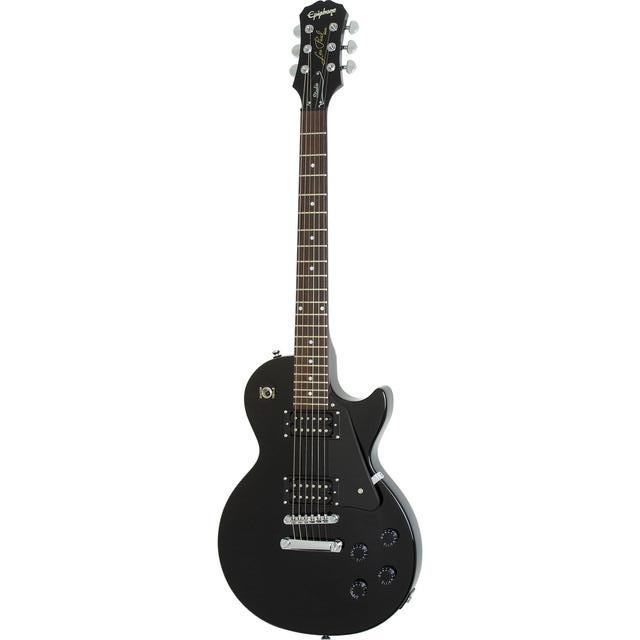


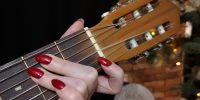
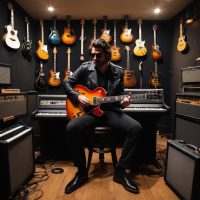

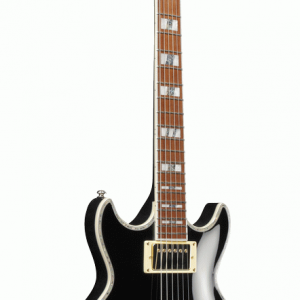
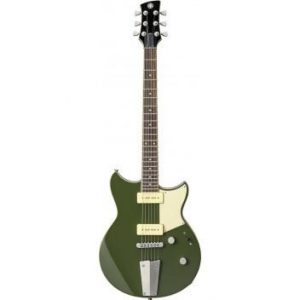
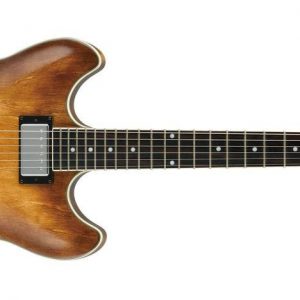
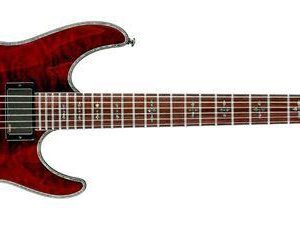
Reviews
There are no reviews yet.